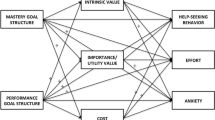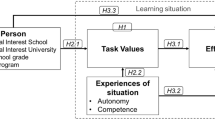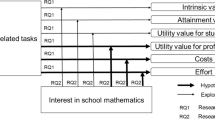Abstract
Recent research shows that teacher support is predictive of student outcomes, such as engagement and effort. In this study, we explored the relation between students’ perceptions of teacher instrumental support in mathematics lessons and their effort in mathematics. We also tested whether this relation was mediated through students’ perception of the utility value, cost, and intrinsic value of mathematics. The study was designed as a cross-sectional survey. The participants included 309 9th and 10th grade Norwegian high school students. Three dimensions of mathematics task values were measured: utility value, intrinsic value, and the cost of working with mathematics. The data were analyzed by means of structural equation modeling. Instrumental support was directly and positively related to both the utility value and the intrinsic value of mathematics. However, it was only indirectly related to the perceived cost of working with mathematics, mediated by the utility value and the intrinsic value. Instrumental support was also both directly and indirectly related to effort. The indirect relation was mediated by the students’ perception of mathematics task values.



Similar content being viewed by others
References
Ahmed, W., Minnaert, A., Werf, G., & Kuyper, H. (2010). Perceived social support and early adolescents’ achievement: The mediational roles of motivational beliefs and emotions. Journal of Youth and Adolescence, 39(1), 36–46. doi:10.1007/s10964-008-9367-7.
Bandura, A. (1977). Self-efficacy—toward a unifying theory of behavioral change. Psychological Review, 84(2), 191–215.
Bandura, A. (1997). Self-efficacy: The exercise of control. New York: Freeman.
Berger, J. L., & Karabenick, S. A. (2011). Motivation and students’ use of learning strategies: Evidence of unidirectional effects in mathematics classrooms. Learning and Instruction, 21(3), 416–428. doi:10.1016/j.learninstruc.2010.06.002.
Byrne, B. M. (2010). Structural equation modeling with AMOS: Basic concepts, applications, and programming. New York: Routledge.
Deci, E. L., & Ryan, R. M. (2000). The “what” and “why” of goal pursuits: Human needs and the self-determination of behavior. Psychological Inquiry, 11(4), 227–268.
Durik, A. M., Vida, M., & Eccles, J. S. (2006). Task values and ability beliefs as predictors of high school literacy choices: A developmental analysis. Journal of Educational Psychology, 98(2), 382–393. doi:10.1037/0022-0663.98.2.382.
Eccles, J. S. (2007). Families, schools, and developing achievement related motivations and engagement. In J. E. Grusec & P. D. Hastings (Eds.), Handbook of socialization (pp. 665–691). New York: Guilford Press.
Eccles, J. S., Adler, T. F., Futterman, R., Goff, S. B., & Kaczala, C. M. (1983). Expectancies, values, and academic behaviors. In J. T. Spence (Ed.), Achievement and achievement motivation (pp. 75–146). San Fransisco: Freeman.
Eccles, J. S., & Wigfield, A. (2002). Motivational beliefs, values, and goals. Annual Review of Psychology, 53, 109–132.
Felner, R. D., Aber, M. S., Primavera, J., & Cauce, A. M. (1985). Adaptation and vulnerability in high-risk adolescents—an examination of environmental mediators. American Journal of Community Psychology, 13(4), 365–379. doi:10.1007/Bf00911214.
Furrer, C., & Skinner, E. (2003). Sense of relatedness as a factor in children’s academic engagement and performance. Journal of Educational Psychology, 95(1), 148–162. doi:10.1037/0022-0663.95.1.148.
Harackiewicz, J. M., Rozek, C. S., Hulleman, C. S., & Hyde, J. S. (2012). Helping parents to motivate adolescents in mathematics and science: An experimental test of a utility-value intervention. Psychological Science, 23(8), 899–906. doi:10.1177/0956797611435530.
Hidi, S., & Renninger, K. A. (2006). The four-phase model of interest development. Educational Psychologist, 41(2), 111–127. doi:10.1207/s15326985ep4102_4.
House, J. (1981). Work stress and social support. Reading, MA: Addison-Weslay.
Hu, L.-T., & Bentler, P. M. (1999). Cutoff criteria for fit indexes in covariance structure analysis: Conventional criteria versus new alternatives. Structural Equation Modeling, 6(1), 1–55.
Hulleman, C. S., Durik, A. M., Schweigert, S. A., & Harackiewicz, J. M. (2008). Task values, achievement goals, and interest: An integrative analysis. Journal of Educational Psychology, 100(2), 398–416. doi:10.1037/0022-0663.100.2.398.
Karabenick, S. A., & Sharma, R. (1994). Perceived teacher support of student questioning in the college classroom—its relation to student characteristics and role in the classroom questioning process. Journal of Educational Psychology, 86(1), 90–103. doi:10.1037/0022-0663.86.1.90.
Malecki, C. K., & Demaray, M. K. (2003). What Type of support do they need? Investigating student adjustment as related to emotional, informational, appraisal, and instrumental support. School Psychology Quarterly, 18(3), 231–252. doi:10.1521/scpq.18.3.231.22576.
Marchand, G., & Skinner, E. A. (2007). Motivational dynamics of children’s academic help-seeking and concealment. Journal of Educational Psychology, 99(1), 65–82. doi:10.1037/0022-0663.99.1.65.
Metallidou, P., & Vlachou, A. (2007). Motivational beliefs, cognitive engagement, and achievement in language and mathematics in elementary school children. International Journal of Psychology, 42(1), 2–15. doi:10.1080/00207590500411179.
Niehaus, K., Rudasill, K. M., & Rakes, C. R. (2012). A longitudinal study of school connectedness and academic outcomes across sixth grade. Journal of School Psychology, 50(4), 443–460. doi:10.1016/j.jsp.2012.03.002.
Pintrich, P. R., & Degroot, E. (1992). Student motivation and self-regulated learning in different classroom contexts. International Journal of Psychology, 27(3–4), 572–572.
Renninger, K. A., & Hidi, S. (2011). Revisiting the conceptualization, measurement, and generation of interest. Educational Psychologist, 46(3), 168–184. doi:10.1080/00461520.2011.587723.
Roeser, R. W., Eccles, J. S., & Sameroff, A. J. (1998). Academic and emotional functioning in early adolescence: Longitudinal relations, patterns, and prediction by experience in middle school. Development and Psychopathology, 10(2), 321–352.
Roeser, R. W., Eccles, J. S., & Sameroff, A. J. (2000). School as a context of early adolescents’ Academic and Social-Emotional Development: A summary of research findings. Elementary School Journal, 100(5), 443–471.
Sakiz, G. (2012). Perceived instructor affective support in relation to academic emotions and motivation in college. Educational Psychology, 32(1), 63–79. doi:10.1080/01443410.2011.625611.
Sakiz, G., Pape, S. J., & Hoy, A. W. (2012). Does perceived teacher affective support matter for middle school students in mathematics classrooms? Journal of School Psychology, 50(2), 235–255. doi:10.1016/j.jsp.2011.10.005.
Semmer, N. K., Elfering, A., Jacobshagen, N., Perrot, T., Beehr, T. A., & Boos, N. (2008). The emotional meaning of instrumental social support. International Journal of Stress Management, 15(3), 235–251. doi:10.1037/1072-5245.15.3.235.
Shechter, O. G., Durik, A. M., Miyamoto, Y., & Harackiewicz, J. M. (2011). The role of utility value in achievement behavior: The importance of culture. Personality and Social Psychology Bulletin, 37(3), 303–317. doi:10.1177/0146167210396380.
Skaalvik, E. M., & Skaalvik, S. (2013). School goal structure: associations with students perception of teachers as emotionally supportive, academic self-concept, instrinsic motivation, and help seeking behavior. International Journal of Educational Research, 1, 5–14.
Suldo, S. M., Friedrich, A. A., White, T., Farmer, J., Minch, D., & Michalowski, J. (2009). Teacher support and adolescents’ subjective well-being: A mixed-methods investigation. School Psychology Review, 38(1), 67–85.
Tabachnick, B. G., & Fidell, L. S. (2007). Using multivariate statistics. Boston: Pearson/Allyn and Bacon.
Wang, M. T., & Eccles, J. S. (2012). Social support matters: Longitudinal effects of social support on three dimensions of school engagement from middle to high school. Child Development, 83(3), 877–895. doi:10.1111/j.1467-8624.2012.01745.x.
Wentzel, K. R. (1994). Relations of social goal pursuit to social acceptance, classroom behavior, and perceived social support. Journal of Educational Psychology, 86(2), 173–182. doi:10.1037/0022-0663.86.2.173.
Wentzel, K. R. (1998). Social relationships and motivation in middle school: The role of parents, teachers, and peers. Journal of Educational Psychology, 90(2), 202–209. doi:10.1037//0022-0663.90.2.202.
Wentzel, K. R., Battle, A., Russell, S. L., & Looney, L. B. (2010). Social supports from teachers and peers as predictors of academic and social motivation. Contemporary Educational Psychology, 35(3), 193–202. doi:10.1016/j.cedpsych.2010.03.002.
Wigfield, A., & Cambria, J. (2010). Students’ achievement values, goal orientations, and interest: Definitions, development, and relations to achievement outcomes. Developmental Review, 30(1), 1–35. doi:10.1016/J.Dr.2009.12.001.
Wigfield, A., & Eccles, J. S. (2002). Development of achievement motivation. San Diego, CA: Academic Press.
Wigfield, A., Tonks, S., & Klauda, S. L. (2009). Expectancy-value theory. In A. Wigfield & K. R. Wentzel (Eds.), Handbook of motivation at school (pp. 55–77). New York: Routledge.
Yildirim, S. (2012). Teacher support, motivation, learning strategy use, and achievement: A multilevel mediation model. Journal of Experimental Education, 80(2), 150–172. doi:10.1080/00220973.2011.596855.
Author information
Authors and Affiliations
Corresponding author
Rights and permissions
About this article
Cite this article
Federici, R.A., Skaalvik, E.M. Students’ perception of instrumental support and effort in mathematics: the mediating role of subjective task values. Soc Psychol Educ 17, 527–540 (2014). https://doi.org/10.1007/s11218-014-9264-8
Received:
Accepted:
Published:
Issue Date:
DOI: https://doi.org/10.1007/s11218-014-9264-8




